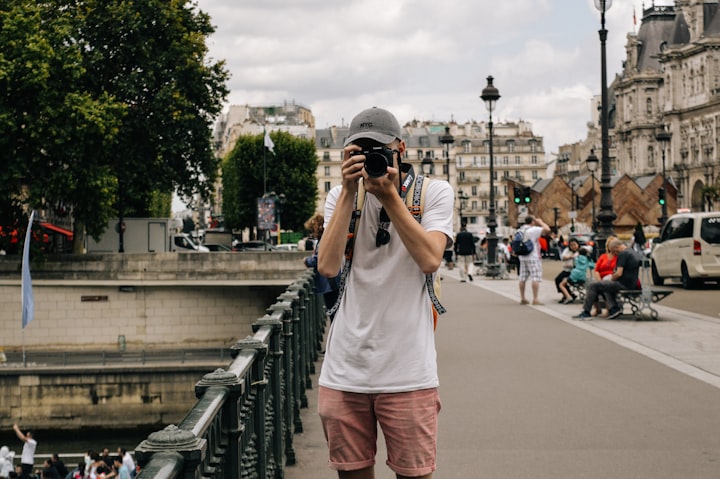
I’ve heard many Americans gawk when I say I live in Paris. “It must be a dream! I’d love to just visit!” To which I usually respond, “It’s alright.”
Living in a touristy city vs being a tourist in the said city are two completely different things.
However, there are definitely ways you can live the dream of a stereotypical tourist in Paris.
Blocking Narrow Streets and Hallways
I’m convinced that the kids who stopped in the middle of a narrow hallway in high school grow up to do the exact same thing in cities.
Paris can be stressful. In a new place, you’re automatically lost. And in a city with streets and sidewalks of varying sizes, you’ll need to get your bearings multiple times.
It’s not uncommon to see Parisians booking it to beat the transport rush, or simply trying to get from place A to B on their off days.
So when we turn down a sidewalk that is completely taken up by a small group of people trying to figure out where the Louvre is, instead of walking a few feet/meters towards the literal expansive street behind them to double-check directions, it’s a bit annoying. Especially at the height of tourist season.
What to do instead:
Try to find a more open space or a less crowded shop to get your bearings. It’ll lower your residual stress and won’t impede others from getting where they’re going.
Not Following Basic Transport Etiquette
“Why wait for others to step off of a crowded train?”
This is what I imagine some tourists think while hopping onto the metros.
If you’re unfamiliar with public transport, it’s a common mistake to make. Trains, trams, and buses have a limited amount of time at each stop. Unless there’s an emergency, the doors won’t just stay open.
If you have 1 minute to get off the train, and you’re surrounded by people, the last thing you’ll want is for others to simultaneously get on and block your exit.
Before you ask if all Parisians follow this, the answer is no. If there are literally 3 people in a train car, this rule isn’t necessary.
But at the height of tourist season? People are still going to work, and the city’s population feels like it’s doubled or tripled on certain transport lines. It’s a courtesy.
A quick etiquette guide for transport
Buses: If there are two doors, enter in through the front. If there’s one door, wait for others to get off before getting on.
Metros, trams, trains: wait on the sides of the doors until all/enough people have gotten off. Try to make space for people to come on.
Escalators/automatic platforms: stand on the right, walk on the left. If it’s too narrow for two paths, don’t worry about it.
These are general rules, but check out online forums for perceived transport etiquette if you’re unsure. It makes it much easier for everyone.
Loudly Complain about the Homeless Population
Paris is the city of lights. It’s also just a regular city. A regular city, like most other large cities in the world, has a homeless population.
Paris has high rent and a difficult housing market. You’ll see people in metro stations and outside of some shops. Like in other places, most homeless people are nice and will not do you any harm. If they have a cup in front of them or have a sign, you can give them spare change or fresh food. If they approach you and you don’t have anything to give, or don’t want to, a simple “désolé” or “sorry” is fine.
Not all will accept help, so just be respectful of that and move on with your day.
What to do instead:
- realize that Paris is a populated city with high tourism, not just “the city of lights”
- give something, or don’t
Not Validating Your Transport Ticket
There are horror stories from foreigners, and long-time Parisians, that rose from not validating your transport ticket or pass.
The RATP is the transport governing body in Paris. They employ the people you see giving directions on metro lines, operating the buses/trains/trams throughout the city, and selling you tickets. They also employ people who do “ticket checks.”
When you enter any form of transport, there’s a machine to validate your ticket pass. These tickets help pay for the transport system — which is why you’ll sometimes get your ticket “checked” and pay a fine if it’s not validated.
I understand why they do this, but like all systems, it has its downsides. Namely the abuse of power that can come with it.
People have reported being harassed by a RATP member regarding their ticket validation, such as:
- purchased a new ticket but forget to validate it
- not having ID on them when asked
- threatening to call the police if they don’t pay the fine
- verbally abused/taunted about their French if they’re immigrants/tourists
RATP personnel, like literally every organization run by humans, are prisoners of their behavior. You never know what kind of person you’ll run into, but the safest way is to always make sure your ticket is validated.
What do to instead:
- validate your tickets/passes
- carry ID with you
- know your rights in this situation — they might be different than your home country!
Falling for Scams
As a resident, you tend to hear/see all the different ways people get scammed at touristy locations. Coming to a new place can leave you wide-eyed and mouth agape with wonder. It also makes you susceptible to scams.
The easiest way to keep yourself guarded is to search online for the most common scams in the city. You’ll see many people telling their personal stories and altercations, and quickly see a pattern for the most frequent ones.
Here are just a couple:
- Clipboard donation: someone walks up to you with a clipboard to ask for a signature/donation. Meanwhile, they use the clipboard to block your view while they pickpocket you. Otherwise, they’ll try to bully you into increasing your donation.
- Gifted string/ring: someone approaches you with a string bracelet or a “gold” ring, and wants to give it to you out of the good of their heart. Once you accept it, they’ll start to demand payment.
Pickpockets and con artists will prey on two things: your ignorance and distraction. Keep your valuables safe — as in don’t keep your passport in the easy to access compartment of your Jansport backpack…Might seem like obvious advice but better safe than sorry.
What to do instead:
- check online for the most common scams
- keep your valuables safe — if it’s easy to access for you, it’s easy to access for others
Remember to Enjoy Your Trip
Paris is filled with history and cool tourist attractions. It’s important to remember that traveling/vacationing isn’t all stress or problem-free.
Here’s how to be a better tourist in Paris
- don’t stop in the middle of crowded places
- follow basic transport etiquette
- don’t loudly complain about the homeless population
- validate your transport ticket
- read about common scams
Paris isn’t a perfect place, but neither is any city in the world. If you’re visiting, remember these things to improve your experience.
This article was originally published on the author's Medium profile.
About the Creator
Anu Kumar
Writing about the brain, culture, and everything in between. Researcher, expat, and book addict. Head editor of par-desi.com.






Comments
There are no comments for this story
Be the first to respond and start the conversation.